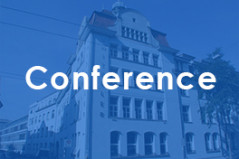Conference
The history of capitalism has attracted ever growing interest among scholars in the last decade. Several studies aimed for exploring the role of violence and imperialism for the implementation of capitalist economies across the world and studied the relation between state policy and economic actors. Others have expounded on the role of consumption for the establishment of industrial production, the increased commodification of everyday life, or the social embeddedness of economic interaction. Due to the role of entrepreneurial competition and the reliance on credit, capitalism is characterized by a high degree of volatility. Time management and the evaluation of future developments are thus crucial for economic actors.
Yet, even though pioneering studies such as those of E. P. Thompson (1967) or Jacques Le Goff (1960) pointed out the role of temporal regimes in the implementation of capitalism, only few studies have picked out this topic as a central theme so far (Sewell 2008; Beckert 2016; Ogle 2019). This conference aims for breaking new ground by exploring the significance of temporal regimes for the breakthrough of capitalism globally.
It will address the following themes in particular:
1) The contributions will explore whether capitalist economies are structured by a particular manner of time management and calculating the future and examine when, and why, such techniques were implemented.
2) Papers will examine the extent to which capitalist economies were confronted with the ‘non-simultaneity of the simultaneous’ across the world. Were there frictions between linear capitalist time orders and other temporalities (such as natural cycles) and how did actors cope with, or capitalize on, respectively, such challenges?
3) How can the temporalities of capitalism be linked to recent debates about the Anthropocene? Could it be that the economic capacity of capitalism, rendered possible, among other things, by an efficient time management, destroyed the very ecological basis on which it relied in the first place?
By linking the history of temporality, which has become a vibrant research field in the last few years, to the history of capitalism, the workshop aims for confirming that economic history in general, and the history of capitalism in particular, cannot be understood without investigating the cultural processes that accompanied, and often rendered possible, the implementation of specific economic structures.
The conference is funded by the Historical Institute and the Center for Global Studies of the University of Bern.
PROGRAMME
THURSDAY, 23 JUNE
13:00 Reception
13:30 Introduction: Christof Dejung (Bern) and Moritz von Brescius (Harvard and Bern)
14:00 Panel 1: Investors and Economic Expectations
Chair: Mischa Suter (Geneva)
Alexia Yates (Manchester): Investor Time: A View from Nineteenth-century Europe Ekaterina Svetlova (Twente): Economic Expectations in an Age of Artificial Intelligence
15:30 CoffeeBreak
16:00 Panel 2: Socialism and the Quest for Alternatives to Capitalism
Chair: David Rentsch (Bern)
Claudia Roesch (GHI Washington): Temporal Alternatives to Capitalism: The Role of Temporal Concepts in 19th-Century Early Socialist Reform Concepts
Marcus Colla (Cambridge): Time Clashes - Global Capitalism and the Crisis of State Socialism
17:30 Keynote 1
Prasannan Parthasarathi (Boston): The Temporalities of Nature and Agriculture in Colonial South India
Chair: Moritz von Brescius (Harvard und Bern)
19:30 Dinner
FRIDAY, 24 JUNE
9:00 Panel 3: Time is Money
Chair: David Rentsch (Bern)
Mischa Suter (Geneva): Beyond Futurity and Acceleration: Uneven Temporalities of Money in Imperialism
Aidan Collins (Sheffield): The Timing of Failure in Bankruptcy Proceedings, 1674-1750
11:00 CoffeeBreak
11:00 Panel4:CapitalistTimeandtheBiologicalRhythmsofAgriculture
Chair: Damien Clavel (Zurich)
Moritz von Brescius (Harvard and Bern): Rubber, Scarcity Imperialism, and the Timing of Commodity Frontiers in the Industrial Age
Andreas Bolte (Freiburg): Temporalities of Rubber Production in Late Colonial Malaysia and Indonesia (1900-1940)
13:00 Lunch
14:30 Panel 5: Commodity Frontiers and Multi-temporal Regimes
Chair: Christof Dejung (Bern)
Francisco Rivera (Washington and Toronto): Capitalist Temporalities and Interrelations of Agropastoral and Industrial Spaces in Ollagüe, Northern Chile (1890-1992)
Javier Francisco (Freiburg): Multiple Temporal Regimes at Indigenous-Imperial Contact Zones in North America
16:00 CoffeeBreak
16:30 Panel6Macro-Temporalities:CyclesandRhythmsofGlobalTrade
Chair: Juri Auderset (Bern)
Mark Metzler (Washington): Macro-temporalities of Capitalism: The Trans-Atlantic Slave Trade and “the Birth of the Business Cycle”
Lesley Nicola Braun (Basel), Rhythms of Trade and Siren Songs: Importation Practices in the Democratic Republic of Congo
20:00 Dinner
SATURDAY, 25 JUNE
9:00 Panel 7 Infrastructure and Material Flows
Chair: Alexander Engel (Basel)
Monika Dommann (Zurich): Just in Time. The Temporality of Material Flows and Warehouses
Juri Auderset (Bern): Filling Up the Pores of Farm Work: Time, Agriculture and Industrial Capitalism
10:30 CoffeeBreak
11:00 Panel8:ScholarlyAccountsofEconomicTemporality
Chair: Moritz von Brescius (Harvard and Bern)
Alexander Engel (Basel): Bandits, Prophets, or Burros? Conceptualizing Speculators in Futures Markets
12:00 Concluding Discussion
Organised by
Christof Dejung (Bern), Moritz von Brescius (Harvard and Bern)
Veranstaltungsort
Hotel Bad Murtensee
Hauptstrasse 5
3286
Muntelier
Zusätzliche Informationen
Kosten
CHF 0.00
Anmeldung
